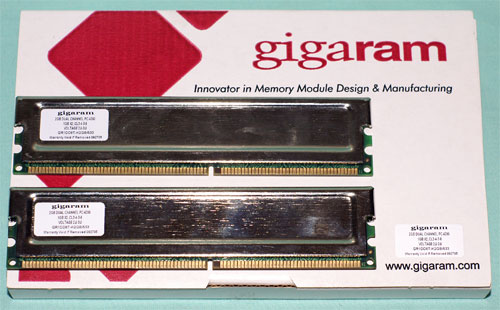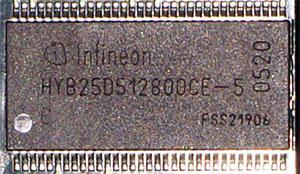1GB DIMMs: FAST 2GB DDR Kits from Corsair, Gigaram, and OCZ
by Wesley Fink on October 11, 2005 2:55 PM EST- Posted in
- Memory
Gigaram 2GB Dual Channel PC-4200
Several weeks ago, we were contacted by a memory company called Gigaram to ask if we would be interested in reviewing their new 1GB modules. Since we were planning a review of the Corsair and OCZ 1GB DIMMs, it seemed a good fit to include Gigaram.
Who is Gigaram? Gigaram is a California based memory module manufacturer established in 1996. Founders were a team of engineers with over 12 years experience in the memory industry. Based on the current product offerings, which include a number of memory products targeted at the enthusiast, Gigaram is keenly interested in the Enthusiast and Gamer market.
If you would like to know more about them, you can start at their website, www.gigaram.com. Perhaps an even better indication that Gigaram is a serious player is that you can find their memory products for sale at New Egg, which is the largest E-tailer on the web.
Specifications
While also based on Infineon chips like the Corsair, Gigaram is rated at the much slower 3-4-3-8 timings, but at the much higher speed of DDR533. This is a higher rated speed than what we could reach with the Corsair memory, so either Gigaram is using different Infineon chips or the binning setup is quite different.
Voltage is rated at 2.9V-3.0V - again, a much higher voltage rating than what we found with Infineon chips on the Corsair memory.
Test Results
To be considered stable for test purposes, Quake3 benchmark, UT2003 Demo, Super PI, Aquamark 3, and Comanche 4 had to complete without incident. Any of these, and in particular Super PI, will crash a less-than stable memory configuration.
The performance of the Gigaram 1GB modules was significantly better than what we expected from the published specifications. In every case, it met at least the memory timings of the much faster rated Corsair memory. Considering both are built with Infineon memory chips, this is not really a surprise.
However, the voltage that can be handled by the Gigaram 1GB memory is much higher than the Corsair DIMMs, and the Gigaram handles the higher voltages by providing better performance. That is not really a compliment, since the Corsair goes to about the same places everywhere (but the top) on the much lower 2.7V.
Since the voltage requirements and performance are quite different, we suspect that the Corsair and Gigaram use slightly different Infineon memory chips in their design. We have heard that manufacturers are using both C-5 and C-6 chips in their high-speed 1GB DIMMs, and we know Gigaram uses CE-6.
Considering that this is the first time that we have ever tested a Gigaram memory, we have to say that we are impressed. This memory clearly belongs in the same league with Corsair and OCZ, which is no small feat for a new memory company pushing into the High-Performance memory market. Time will tell if Gigaram delivers the same level of performance throughout their retail deliveries, but we certainly like what we tested.
Several weeks ago, we were contacted by a memory company called Gigaram to ask if we would be interested in reviewing their new 1GB modules. Since we were planning a review of the Corsair and OCZ 1GB DIMMs, it seemed a good fit to include Gigaram.
Who is Gigaram? Gigaram is a California based memory module manufacturer established in 1996. Founders were a team of engineers with over 12 years experience in the memory industry. Based on the current product offerings, which include a number of memory products targeted at the enthusiast, Gigaram is keenly interested in the Enthusiast and Gamer market.
If you would like to know more about them, you can start at their website, www.gigaram.com. Perhaps an even better indication that Gigaram is a serious player is that you can find their memory products for sale at New Egg, which is the largest E-tailer on the web.


Specifications
While also based on Infineon chips like the Corsair, Gigaram is rated at the much slower 3-4-3-8 timings, but at the much higher speed of DDR533. This is a higher rated speed than what we could reach with the Corsair memory, so either Gigaram is using different Infineon chips or the binning setup is quite different.
| Gigaram 2GB Dual Channel PC-4200 Memory Specifications | |
| Number of DIMMs & Banks | 2 DS |
| DIMM Size Total Memory |
1GB 2GB |
| Rated Timings | 3-4-3-8 at DDR533 at 2.9-3.0V |
| Rated Voltage | 2.9-3.0V |
Voltage is rated at 2.9V-3.0V - again, a much higher voltage rating than what we found with Infineon chips on the Corsair memory.
Test Results
| Gigaram 2GB Dual Channel PC-4200 (DDR533) - 2x1GB Double-Bank | |||||||
| CPU Ratio at 2.4GHz | Memory Speed |
Memory Timings & Voltage |
Quake3 fps |
Sandra UNBuffered | Sandra Standard Buffered |
Super PI 2M places (time in sec) |
Wolfenstein - Radar - Enemy Territory fps |
| 12x200 | 400DDR | 2-3-2-7 2.5V 1T |
544.4 | INT 2650 FLT 2808 |
INT 5953 FLT 5910 |
80 | 120.3 |
| 11x218 | 436DDR | 2-3-2-7 2.7V 1T |
550.9 | INT 2806 FLT 2949 |
INT 6237 FLT 6177 |
80 | 121.4 |
| 10x240 | 480DDR | 2.5-3-2-7 2.8V 1T |
557.4 | INT 2992 FLT 3025 |
INT 6445 FLT 6373 |
79 | 122.8 |
| 9x267 | 533DDR | 3-3-3-7 2.9VV 1T |
561.0 | INT 3147 FLT 3383 |
INT 6665 FLT 6593 |
78 | 123.5 |
| 9x278 (2.45GHz) |
Highest MEM Speed 556 DDR |
3-4-3-7 3.0V 1T |
569.1 | INT 3296 FLT 3496 |
INT 6905 FLT 6855 |
76 | 124.9 |
The performance of the Gigaram 1GB modules was significantly better than what we expected from the published specifications. In every case, it met at least the memory timings of the much faster rated Corsair memory. Considering both are built with Infineon memory chips, this is not really a surprise.
However, the voltage that can be handled by the Gigaram 1GB memory is much higher than the Corsair DIMMs, and the Gigaram handles the higher voltages by providing better performance. That is not really a compliment, since the Corsair goes to about the same places everywhere (but the top) on the much lower 2.7V.
Since the voltage requirements and performance are quite different, we suspect that the Corsair and Gigaram use slightly different Infineon memory chips in their design. We have heard that manufacturers are using both C-5 and C-6 chips in their high-speed 1GB DIMMs, and we know Gigaram uses CE-6.
Considering that this is the first time that we have ever tested a Gigaram memory, we have to say that we are impressed. This memory clearly belongs in the same league with Corsair and OCZ, which is no small feat for a new memory company pushing into the High-Performance memory market. Time will tell if Gigaram delivers the same level of performance throughout their retail deliveries, but we certainly like what we tested.










40 Comments
View All Comments
walmartshopper - Wednesday, October 12, 2005 - link
Thanks for the review. I've been toying around with 4 sticks of Ballistix pc3200, only to get them running at 480mhz with 2.5-3-3-8 2T timings (I got 530mhz with 2 sticks at 1T). It's not too bad, but after reading this, I decided to replace them with the 2x1024 OCZ pc4000. I actually have 5 sticks of Ballistix, and I'm hoping to sell them for 50$ each. Anyone interested?AkumaX - Wednesday, October 12, 2005 - link
I think on Page 2 when you were comparing 2T vs 1T you also meant 2x1024mb vs 4x512mb, rather than 2x512mb vs 4x512mb right?cryptonomicon - Wednesday, October 12, 2005 - link
no, he's comparing the same ram to show how the memory controller goes to crap after you load up more than two dimms. the sticks were both 512x2 plat rev IITheInvincibleMustard - Wednesday, October 12, 2005 - link
Nice, well-written article, Wesley. It seems slightly ironic to me, though, that this review comes out just as I'm expecting a 2GB kit from G.Skill via NewEgg to arrive tomorrow to replace my el-cheapo 2x512 (3-3-3-7 at DDR400? ick)Minor nit: pg 8
"The performance differences will be that the NVIDIA 71.84 driver is a bit faster than the 61.77 and 71.84 drivers used in earlier memory reviews."
Umm ... unless the driver is somehow faster than itself, I'm hoping that's a typo of sorts.
-TIM
n7 - Wednesday, October 12, 2005 - link
I'm glad to see a review on 2x1024 MB; it was past due.I realize there aren't many DDR433 & up 2x1024MB RAM manufacturers, but i would have liked to have seen Crucial, Mushkin, Patriot, Geil, since they all make good DDR400 kits, & at least in Mushkin & Crucial's case, they also make DDR433 & up kits.
To make it simple, i'd like to see a review with a few more companies involved :)
rqle - Tuesday, October 11, 2005 - link
Isnt it a little unfair to say one brand highest speed obtain @ 2-3-2-7 is lower then some other brand higest speed obtain is higher cause of 3-4-3-7? I mean, if you set corsair at a more lax timing AND higher voltage wouldnt it do better? Some one fill me in. Cause i remember back in the old days, memory i bought that can do 2-2-3-6 at 2.5v that was rated at 400DDR would overclock and do much better the same timing and voltage of some-old brand 533DDR+.Wesley Fink - Tuesday, October 11, 2005 - link
From p. 5 of the review:"Increasing voltage beyond 2.7V did not allow us to go any higher in overclocking, nor did more relaxed timings allow us to push higher. The limit is DDR492 - very close to DDR500."
We tried to go higher but DDR492 is the limit with the 1GB Corsair dimms we tested. As we stated in the review it is likely Corsair is using a different Infineon chip than OCZ and Gigaram, or they are binning for best performance in the DDR400 to DDR500 range. Gigaram and OCZ are probably also using different Inineon memory chips - or they are at the least using different binning methodologies.
ozzimark - Tuesday, October 11, 2005 - link
wow.. wesley, long needed article. however, some silly mistakes that i think i see :Dfirst.. the gigaram oc'ing chart. max speed is put at 2-4-3-7.. are you sure it's not 3-4-3-7?
also, the second speed is curiously 2-2.5-2.. where 2.5-3-2 is exepcted
second, i know the difficulties of getting review samples, but where is the biggest name in 1gb sticks right now, crucial ballistix? i have seen many of these sticks do 280-300mhz.
last, i remember the value ram overclocking article you guys had a while back. plan on going the same for 1gb sticks?
Wesley Fink - Tuesday, October 11, 2005 - link
I went back to my test logs and corrected the misplaced values. DD436 is 2-3-2-7 and DDR556 is 3-4-3-7. The second value in all reported strings is RAS to CAS Delay in case anyone is confused by the notation.We hope to do a review of the Crucial Ballistix 1GB dimms in the near future. We haven't decided whether to do a Value 1GB roundup yet, but we will consider your suggestion.
Ender17 - Tuesday, October 11, 2005 - link
;)